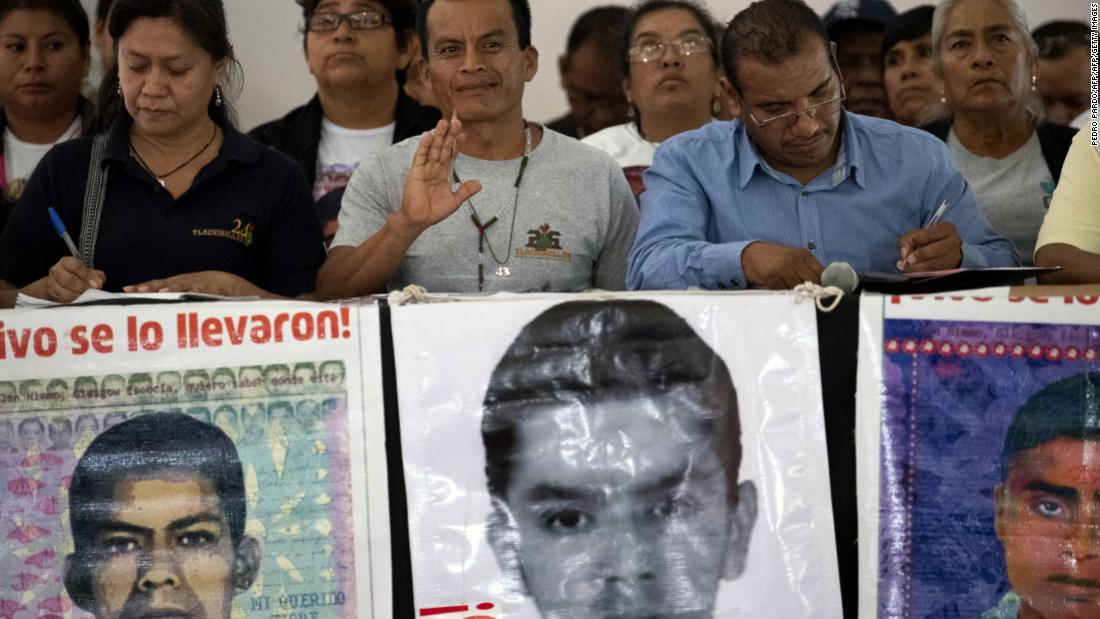
Forty-three students from a teachers' college in the town of Ayotzinapa, in Guerrero State suddenly disappeared on September 26, 2014. Surviving students and witnesses testified that they were attacked by local police, and according to Mexico's then-Attorney General, Jesús Murillo Karam, the Ayotzinapa students were kidnapped in a scheme that allegedly involved local officials, and then later handed over to the criminal group Guerreros Unidos, which operates throughout Mexico's southwestern region.
For the past five years, their parents have been demanding answers as to their whereabouts -- just a small part of the more than 40,000 people registered missing in Mexico, according to the Mexican government. No one has ever been convicted in connection to their disappearance.
The original investigation conducted by the administration of former President Enrique Peña Nieto has been widely criticized as ineffective and full of discrepancies, and now must be reviewed for failures of due process, according to Mexico's undersecretary of Human Rights Alejandro Encinas. Murillo defended his handling of the case in an interview this week with CNN en Español anchor Carmen Aristegui, maintaining that the original investigation was carried out properly and offering to assist in any further investigation.
Government prosecutors and investigators originally concluded that the group burned their bodies in a landfill and tossed their remains in a nearby river. But an examination by Argentine forensic experts contradicted the investigation by Mexican authorities. Information they gathered did not, "back up the hypothesis that there was a fire on the morning of September 27, 2014, of the required magnitude and duration that would've resulted in the massive incineration of the 43 missing students," the forensic team said. The Inter-American Commission on Human Rights also disagreed that that there was evidence to suggest their bodies had been burned.
Who is responsible?
Of the more than 140 people originally detained in connection to the case, 77 were released after a judge dismissed cases due to insufficient evidence or reports that many of the detained were tortured. The rest have cases pending.
During a press conference early this month, Encinas warned that others might also be released because of similar irregularities in the case.
The most notable release is that of Gildardo López Astudillo, better known as "El Gil," who was accused of ordering the disappearance of the 43 students. A judge in Tamaulipas had absolved López Astudillo after concluding that there was insufficient proof of a crime. Dozens of pieces of evidence were tossed because of the torture allegations. López Astudillo has maintained his innocence.
In an interview with CNN, Mexican Senator Lupita Murguia, who led the special commission investigating the case of the missing students for Mexico's lower chamber of congress where she then served, called the release of suspects grave, noting that those freed cannot be retried for the same charges in a later investigation.
A new investigation
For many who have closely followed the case, the need for a new, transparent investigation is fundamental.
Mexico's current President Andrés Manuel López Obrador has created a new commission to reopen the investigations from scratch, looking into judges and officials as well to see where there might have been violations of due process.
During one of his daily press conferences this month, López Obrador said this would heal "a wound that affects us all." He called on anyone who might have "intervened" during the incident with the students to step forward and to "count on the protection of the government."
On Tuesday, the Mexican government announced it would question former Guerrero Governor Angel Aguirre Rivero, the state's former prosecutor Iñaki Blanco, and the state's then-Secretary of Public Safety Leonardo Vasquez Perez in the new investigation spearheaded by the López Obrador administration. None of them have been formally accused.
"Five years after the forced disappearance of the 43 young students at Ayotzinapa, the Mexican authorities still owe a great outstanding debt to the victims, their families and society in terms of guaranteeing their rights to the truth, justice and reparation for the harm done," executive director of Amnesty International Mexico, Tania Reneaum Panszi, said this week in a statement.
The Washington Office on Latin America, WOLA, a human rights advocacy group, also released a statement saying that Peña Nieto's administration handling of the Ayotzinapa investigation had "heightened public support for much-needed reforms."
"We want them back alive!"
The move towards a new investigation has renewed hope for answers from many relatives of the missing students.
"We have hope in the commission led by Encinas and we hope that soon there will be real information for us as well," the spokesman of the parents of the missing, Felipe de la Cruz, told CNN en Español on Monday. Not knowing where their children are "eats at their soul," de la Cruz said on his Facebook page Wednesday.
"They had us full of lies," said Cristina Bautista, referring to the previous government. The mother of one of the missing 43 was sitting on a panel at the University Museum of Contemporary Art in Mexico City Monday.
"We, the parents, are cleaning up their lies and now it's different," said Bautista. "We're moving slowly but we have hope that we will get to the truth and we only hope that it won't take so long, that it can be fast."
On Thursday, a Catholic mass and procession took place in Mexico City to honor the students on the fifth anniversary of their disappearance. While many questions remain, their relatives are clear on one thing, as they take to the streets with the familiar chant they have been repeating since their disappearance: "They were taken alive, we want them back alive!"
No comments:
Post a Comment